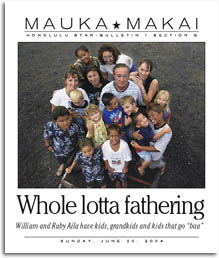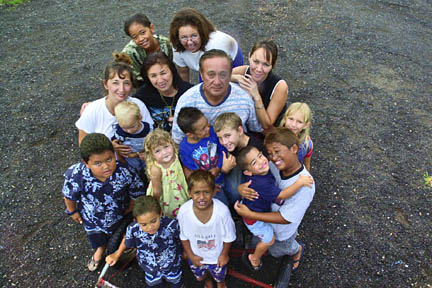
[ MAUKA MAKAI ]
William Aila's children are able farm hands thanks to his training. Here, he watches son Ivan and Ivan's wife, Theresa, pen goats at the family's Waianae farm.
The working Ailas
William and Ruby Aila teach
their kids love, respect
and the value of work
William Aila has 10 children who call him Dad, 31 grandchildren who call him Grandpa and 12 small goats that call him Bla-a-a-a-ah, especially when they're hungry. This doesn't even count the horses, dogs, regular-size goats, the donkey and three great-grandchildren (plus one on the way). Or all the plants. Or trucks.
William and Ruby Aila rule over this extremely extended family of many living things on their large lot out at the very end of Puuhulu Road in Waianae.
All their children and their children and their children live within five miles, except for one adventurer who moved all the way to Pearl City. But the original Aila home, a low-rise six-bedroom structure, is Grand Central, and at any time a dozen or so kids might be about.
Are they ever alone in their house? "No!" the Ailas answer immediately and simultaneously.
"They're my riches," William Aila says of all those kids. "I don't care about money. I'm really happy, I'm really proud that our children reflect well on us. We gave 'em a few good lessons."
We begin this tale with the marriage of William and Ruby 35 years ago tomorrow. It was the second marriage for both -- she brought three children with her; he brought five. As a couple they would have two more. "We took all the children and raised them together," Ruby says.
That original set of children now ranges in age from 31 to 47. All graduated from Waianae High School, and all now have kids of their own.
New generations of Ailas are enjoying the pleasures of farm life at William and Ruby Aila's home in Waianae. Dylan Smith, 10, pets a kid in the goat pen, where human and goat kids hang out.
They grew up on a small family farm with a rodeo arena out back where frequent roping sessions drew riders from all around. Their parents, even though their dad worked two jobs, also ran a nursery on the property and a composting business.
There was so much activity and open space that the number of kids around often swelled. "We had cousins that were only children who wanted to be here," daughter Colleen says.
"... And wouldn't go home," youngest daughter Charlie adds.
But hanging out with the Ailas meant working. Early every morning, the boys tended to the animals, the girls to the plants. After school and on Saturdays, the children's job was to package manure, wood shavings and coral chips for sale to local retailers.
They'd fill the bags assembly-line fashion, Colleen says. "We knew how to fold them, staple them and label them."
"Sometimes we would have 800 bags on one Saturday," Charlie says. Charlie's real name is Angelique, by the way, "but that was just too long for my dad, so he always called me Charlie."
It wasn't all work, though. Sundays were for fun. William often took all the kids on an outing -- not just his kids, but any hangers-on who had worked the day before. They went to carnivals, to the beach, to restaurants (loud, family places, which they'd monopolize).
Money was tight, so all the kids learned its value, as well as the value of an honest day's labor. But their parents also believed in the power of play.
They took their children on trips, to the neighbor islands and to mainland theme parks. And at Christmas the Ailas threw a party for 200 friends and family, complete with Santa -- a friend of William's who'd fly in every year from Santa Barbara, Calif.
"You gotta make it a priority to do these things along the way," Ruby says. "You gotta enjoy your life."
It was a childhood both daughters cherish. "I loved it," Colleen insists. "I actually wish my children could have a taste of that lifestyle -- good, hard work."
The two girls now have seven children between them. "Their biggest job could be taking out the rubbish, and they act like they're dying," Charlie says.
Discipline doesn't seem to have been an issue, thanks to Dad's "magic finger," as his daughters have named his firm right forefinger. Point it and everyone fell in line. "No one ever talked back to my dad," Charlie says. "Ever."
William recalls telling his kids: "The day you earn a paycheck, you can drink and smoke all you want. Till then, I catch you smoking ... I make you eat every cigarette you got."
It's a threat he never had to carry out.
"My wife is sort of a soft 'Gentle Ben,'" William says. "Me, I'm a little rough around the edges. ...
"I tell my wife, 'If I ride them a little hard and they resent me a little bit but if they grow up better people for it, it was worth it.'"
His values, he says, were taught him by his grandfather, and he has passed them on: "Love and respect and the willingness to work."
The animals are William's other children. He raises Nigerian dwarf goats for sale as pets and keeps as his own pets three miniature horses. A herd of regular-size goats sold for meat pays the expenses for the rest of the farm.
William's current prize is a miniature Sicilian donkey that he brought home last year from the Hawaii State Farm Fair.
The farm fair is an annual outing for the Ailas because of the animals (for Dad) and the plants (for Mom). Even with a few grandkids in tow last year, William says it started out as a cheap day out. "Cost me $60 -- but by the time I left it was $2,000 because I bought the donkey." The donkey is named Donkey, by the way, for the Eddie Murphy character in "Shrek."
"I don't drink, I don't smoke," William repeats frequently, so his animals are his hobby and his stress-relief. His dream, in fact, is to open a petting zoo on his property for the disabled so that they can share in a little animal therapy.
On the cover: The Aila clan shares a lot of love and hard work.
The oasis of calm in the Aila home is William and Ruby's relationship. In 35 years they've been apart just five days (and that won't happen again, William says; he didn't like being alone).
Every year since 1971, they've taken a kid-free vacation, a big one, three weeks at a time to a place like Canada or Mexico. Of course, that's normally followed later in the year with a family trip, these days with various grandkids.
Their sacrifices have resulted in some payback, with their kids inheriting their core values. Several, for example, own their own businesses and come daily to the farm to help out. Phone conversations and visits end with an "I love you."
When the Ailas turned 50, their children threw them a party with 800 guests, many invited from across the mainland. They saved for two years to pay for the event, $50 per child per month.
The yearly Christmas party is no more, but the children retain its spirit in a three-day campout every Labor Day weekend. A highly organized affair, it comes complete with an annual T-shirt for everyone.
William and Ruby turn 65 this year. Life has calmed somewhat, although they still work at a pace that puts smaller families to shame. Ruby regularly cooks for a crowd; William, ostensibly retired, still works the family farm from 5 a.m. to 8 or 9 at night and serves as coordinator of an organic farming program for at-risk Waianae youths. Today, Father's Day, he'll be at the organic farm all day, except for a break for church.
But work is not an issue, if you hadn't noticed. "It's kept me healthy," William says.
No regrets.
"Every morning, I feel for my wife, make sure she's there. I tell her I love her. Then I open the window and thank God for the day."
Click for online
calendars and events.





